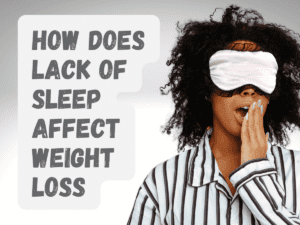How does lack of sleep affect weight loss?
Learn Why is Sleep Important For Metabolic Health
Are you someone for whom getting a good night’s sleep is impossible? If so, then you may be at a disadvantage when it comes to weight loss.
Research has shown that poor sleep quality is directly related to weight gain and difficulty with weight loss.
One way that insufficient sleep can affect your body’s ability to lose weight is by interfering with hormones responsible for hunger regulation.
Studies have found that inadequate sleep or sleep deprivation can lead to higher levels of the hunger-causing hormone ghrelin, while reducing the hunger-suppressing hormone leptin.
This hormonal imbalance can cause an increase in cravings for unhealthy foods and a decrease in self-control when it comes to making food choices resulting in a higher body mass index and increased risk of poor metabolic health.
Have you tried sleeping pills, many prescription drugs, supplements, herbal tea and all the relaxation techniques in an attempt to help you either fall asleep quickly, get better sleep, stay asleep or even just feel rested in the morning, but can’t work out why you have poor sleep quality?
Are you more tired of hearing about the most popular causes such as underlying stress, work deadlines, sleep problems, mental health disorders like anxiety and depression, physical illnesses and pain, medications and insomnia?
Well, the truth is they are not the reason you have sleep disturbance, they are contributory factors.
None of them is actually the root cause of why you have poor sleep quality.
The real reason could be that your metabolic pathways are using your cortisol hormones to balance blood sugars throughout the day causing circadian rhythm sleep disorders.
The best way to treat this kind of sleep disorder is to address the underlying cause and not the symptoms. This can involve changes to eating habits, take regular exercise and a variety of supplements that support the metabolic pathways responsible for restoring proper circadian rhythm.
These steps ensure a better balance in hormones like melatonin, cortisol and serotonin which are essential for improved sleep quality and can ultimately help in long-term weight loss in healthy adults.
By taking the right steps to address the underlying cause of your sleep disturbance, you can ensure that you are making healthy lifestyle changes to support both good sleep and successful weight control.

In our busy lives, it can be very easy to attribute sleepless nights to a host of common factors such as stress, mental health issues, body temperature, hormones and the everyday pressures of work or home life.
And whilst it’s true that these things can influence how we feel within ourselves when we can’t get restful sleep this may in fact be a clue or symptom of poor metabolic health.
If you have been managing sleep disturbance, restless legs syndrome, or struggle to get good quality sleep, this indicates an underlying imbalance within your main metabolic pathways.
What is the impact of poor sleep habits?
Ensuring you have a consistent sleep schedule is a major factor in our lifestyle factors.
When you wake up feeling groggy and feel tired or have excessive daytime fatigue it can have a huge impact on what you do or choose to eat throughout the day as you try to increase your energy levels.
More often the poor food choices are high-energy carbohydrates, sweet treats and comfort foods which will only make you feel worse and then you are more likely to take it easy and rest all day.
There are a number of generic solutions to improve sleep nighttime habits or chronic insomnia that a quick Google search will retrieve namely: not using electronic devices or watching tv before bed, keeping your feet warm and getting enough exercise, however, some of us discover that no matter what we do, we still find ourselves lying awake, and waking up feeling less than refreshed.
With that in mind, if you have daytime sleepiness and have been managing various other symptoms such as high blood pressure, for over two or more years with the use of over-the-counter medication or supplements alone, then your metabolic pathways are likely struggling to utilise the energy and nutrients from the food you eat and dispose of toxins properly.
But fundamentally your poor food choices are creating an imbalance in your energy intake, impacting your blood sugars which demand too much of your cortisol hormones throughout the day to support appetite regulating hormones.
This creates a chronic cycle of energy and cortisol imbalance within your body and eventually manifests as sleep disturbances.
Whilst stress, physical illness, medications and insomnia can contribute to sleepless nights, the root cause is likely to be due to an imbalance in the metabolic pathways caused by poor dietary choices or lifestyle habits. Treating the underlying cause of your sleep disturbance is key to ensuring successful weight control and restoring optimal sleep health.
By making healthy lifestyle changes such as eating a balanced diet, managing stress levels and exercising regularly you can help restore hormonal balance and improve your circadian rhythm.
Why is sleep important to weight loss?
I’m Jen Adams, my purpose is to help those who don’t lose weight by dieting, fasting and exercising to discover what they can do to move away from being frustrated, depressed and tired to feeling confident, and in control about what to eat and when so they can achieve and maintain their ideal weight.
In this series of articles about the symptoms poor metabolic health, you’ll understand the importance of how you feel and what you can see when you look in the mirror as contributory factors to your metabolic health.
- Why am I NOT losing weight?
- Why am I always TIRED?
- Why do I always FEEL so anxious?
- Why am I CRAVING food so much?
- Why is my body ACHING all over?
- Why am I SO bloated and have acid reflux?
- Why am I ALLERGIC to everything?
When these every day symptoms are only managed with over the counter medication and no lifestyle intervention or nutrition support the underlying systemic imbalances can increase the risk of developing metabolic syndrome, nonalcoholic fatty liver disease, autoimmune diseases, inflammation and cardiovascular disease.
Does sleep affect weight loss?
If you only treat these symptoms with medicine alone for more than two years, without any nutritional lifestyle intervention, your metabolic pathways will begin to fail, and your symptoms may develop into a systemic imbalance in your metabolic health, such as sleep apnea, chronic insomnia or high blood pressure.
Your metabolic health is incredibly important and fundamentally everyday symptoms related to an imbalance or malfunction relating to either one or in part all three of functional metabolic pathways:
Delivery of energy to your cells, detoxification of toxins and absorption of raw ingredients.
If you suffer from daytime sleepiness, fatigue or poor cognitive function due to a disrupted night’s sleep and have been managing these with over-the-counter medication alone without dietary lifestyle changes for over two years then it is likely your metabolic pathways are struggling to utilise the energy and nutrients from your food.
What is the cause of sleep difficulties?
The main cause of a good night’s rest is due to the body’s ability to regulate and optimise cortisol levels during the day and throughout the night.
Cortisol is a stress hormone that is released by the adrenal glands in response to physical or emotional stress day and night.
Cortisol levels are naturally highest in the morning and gradually decline throughout the day, reaching their lowest levels at night. This natural dip in cortisol levels is what signals to the body that it’s time to sleep.
This dip signals the serotonin in the brain, production from tryptophan in the gut, it is time to sleep and then melatonin in the pineal gland to control sleep patterns.
However, when cortisol levels remain high throughout the day and night, it can interfere with the body’s natural sleep cycle and not trigger the cascades of hormones required to regulate a sleep pattern
As a result, your blood sugar levels will influence your sleep quality as this delivers the glucose into the cells to create mitochondria for energy.
You will notice this when you monitor your blood glucose levels with a continuous glucose monitor.
Therefore, by eating healthy, nutrient-dense foods and maintaining a balanced diet that is rich in antioxidants and omega-3 fatty acids, managing stress levels and exercising regularly you can help restore hormonal balance and improve your circadian rhythm.
When you eat before bedtime you will notice how your blood sugar levels rise and will stay elevated throughout the night.
Then on rising, before you eat or drink anything you should notice your blood sugar levels will rise, but if you have poor sleep quality they are more likely to be flat line.
By implementing strategies to improve the quality of your sleep and managing your blood sugar levels with a balanced diet, you will be able to restore balance in the body’s hormonal systems.
What are circadian rhythms?
Circadian rhythms are essentially your sleep cycles. They are regulated by an internal biological clock which is responsible for balancing the hormonal regulation of your sleep and wake cycles.
Your circadian rhythm will be affected by factors such as light, activity levels, temperature, hormones and poor food choices.
When these factors become disrupted, it can lead to poor sleep quality and a lack of energy during the day.
Your circadian rhythm is your body’s natural, internal sleep, wake cycle that repeats each day – or 24 hours.
It can be affected by many variables: light, dark, insulin levels and mostly stress.
According to Very Well Mind, around 43% of adults have said that stress has kept them up at night at least once in the last month.
Each and every one of us experiences a variation of stress at some point in our lives, but higher levels of cortisol can disrupt the circadian rhythm and your body clock, which increases your chances of developing metabolic syndrome.
This is because when too much cortisol is required to get through the day, it impacts your ability to manage the sleep cycle efficiently.
It is important that cortisol and blood sugar levels drop before you sleep, to allow the serotonin levels to rise to ensure your body rests and repairs throughout the night and you can get a full night of quality sleep.
Disrupted Sleep Patterns
Why do I wake at 2am and can’t get back to sleep?
If you discover that you CAN get to sleep, but find that you wake up throughout the night, unable to get settled again, you may be experiencing disturbed sleep due to the nightly liver cleanse, or your liver’s “active” hours.
The theory of the liver’s active times comes from the Chinese Meridian Clock, also known as the “body clock” or “Horary” clock and focuses on the amount of Qi, or chi (the body’s life force, or vital energy) flowing through the body at a certain time.
During the hours of 1:00 am to 3:00 am, the liver begins cleansing your blood and processing any waste.
If you often wake up at these hours, you may be over-taxing your liver during the day with too much stress and/or a poor diet.
It’s also no surprise that drinking alcohol or taking medications often wake at this time and experience disturbed sleep and trouble falling back to sleep.
What are the consequences of lack of sleep?
Not getting enough sleep, you can become sleep deprived, this has been linked with poor physical health, cognitive impairment, inflammation, impaired immunity, and chronic pain.
By either not eating enough of the right foods or consuming ultra-processed foods in excess, you will become deficient in essential nutrients and your body will struggle to create the essential hormones for your sleep cycle and absorb the essential nutrients for repair.
Therefore the long term consequences of short sleep duration and poor sleep habits are that they can lead to metabolic diseases such as obesity, metabolic syndrome, type 2 diabetes and cardiovascular disease.
How much sleep should I get?
In order to maintain optimal metabolic health, it is important to get a good night’s sleep of 7-8 hours each night. If you find that you have trouble falling asleep, or sleep badly there are a few things you can do to ensure adequate sleep each day.
Tips for a good night sleep
- Exercise during the day: This will help to release any pent up energy and improve the quality of your sleep.
- Avoid alcohol and caffeine: Both of these substances can cause you to wake up during the night and have difficulty falling back asleep.
- Create a bedtime routine: This can help to signal to your body that it is time to wind down and prepare for sleep.
- Make sure your sleeping environment is comfortable: This means a dark, quiet, cool room with a comfortable mattress and pillow.
- Limit screen time before bed: The blue light from screens can disrupt your circadian rhythm and make it harder to fall asleep.
- Practice some relaxation techniques: This can help to clear your mind and prepare your body for sleep.
If you find that you are still struggling to sleep after trying these tips, it is important to speak to a doctor or healthcare professional as there may be an underlying health condition causing your insomnia.
The main issue related to metabolic health is that sleep deprived participants who have restricted sleep or poor sleep quantity due to sleep disruption are more likely to gain weight in later years due to increased hunger and food desires resulting in consuming more calories, which hinders any weight loss interventions and weight loss efforts as sleep deprived individuals are more likely to have a lower resting metabolic rate which can make weight management and the ability to maintain weight loss more difficult.
Therefore, it is important to maintain a healthy lifestyle with regular exercise and nutritious meals while ensuring that you get quality sleep each night.
This will help to keep your metabolism balanced and ensure that you are able to make the most of any weight loss efforts or interventions.
In summary, when suffering from poor sleep quality or lack of sleep the ability to lose weight or maintain weight loss is often hindered, which can lead to a decrease in energy levels, focus and even physical health. Therefore it is vital to ensure you get quality and adequate sleep each night in order to keep your metabolic health on track.
It is essential to address the stress in your life and ensure you balance your blood sugars as they impact the ability to generate energy efficiently and therefore you won’t rely on cortisol to get you through the day.
You should also focus on enjoying a balanced diet that is rich in proteins, healthy fats, fibres and complex carbohydrates to ensure your body has the building blocks it needs to create the hormones required for a healthy sleep cycle.
Finally, create a bedtime routine and make sure your sleeping environment is comfortable in order to help you fall asleep and stay asleep throughout the night.
In conclusion, the best way to get a good night’s sleep is to focus on balancing your blood sugars, cleansing your liver and improving your gut microbiome.
This will enable you to help regulate your cortisol and insulin sensitivity and deliver energy to your cells, detoxify toxins that disrupt your metabolism and create beneficial bacteria to reduce inflammation, therefore, improving your overall metabolic health.
Your bad night’s sleep is related to what you ate yesterday NOT what you want today.
Breaking the vicious cycle is easy to do by changing what you eat next, and reducing the production of cortisol hormones.
By making the right dietary choices, practising relaxation techniques and creating a comfortable sleeping environment, you can ensure that your sleep quality is improved and your metabolic health remains balanced for long-term energy production.
Getting good quality sleep each night will help to improve overall health, both mentally and physically. So it’s important to take the necessary steps to ensure that your sleep is given its due importance.
With these tips, you’ll be able to improve your metabolic health, enjoy better energy levels and make weight management easier. With just a few small changes in your lifestyle, you can ensure that you get quality sleep each night and enjoy improved overall health as a result.
If you want to lose weight, you MUST understand the impacts your current lifestyle and food choices have had on your metabolic health.
To learn more about Metabolic Health read this article What Is Metabolic Health?

Counting calories, points or sins won’t work for you when you reach early menopause!
If you are feeling lost, overwhelmed and confused as to why you can’t lose weight, let Jen Adams help you.
By understanding nutrition basics for weight loss, you can finally stop dieting and embrace a lifestyle of healthy eating and still achieve your ideal weight.
Most importantly, you’ll learn how to create a personalized plan that works for YOU and still achieve your ideal weight, look fabulous in all your clothes and be a version of yourself that you had given up on.
Learn more about Jen Adams and her approach to – CLICK HERE

